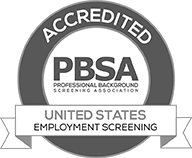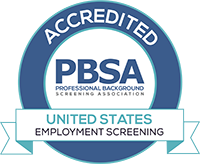BLOG
A New Law Addresses How California Employers Use Criminal Records
March 14, 2017
Recently approved regulations clarify how CA employers may and may not utilize criminal records data when making employment related decisions.
They were sanctioned by the California Fair Employment Housing Council (FEHC) in January, 2017 and are expected to be enforced as of July 1, 2017.
Origins
The new regulations have roots in the Civil Rights Act of 1964, a federal law that protects people from discrimination based on race, color, religion, gender, or national origin. A key purpose of this Act is to help prevent discriminatory practices against job applicants and employees.
In 2012, the Equal Employment Opportunity Commission (EEOC) created a document called the "Consideration of Arrest and Conviction Records in Employment Decisions Under Title VII of the Civil Rights Act of 1964." The purpose was to "consolidate and update the U.S. Equal Employment Opportunity Commission's guidance documents regarding the use of arrest or conviction records in employment decisions."
Many of the EEOC's recommendations were used to help create the FEHC regulations.
What California Employers Should Know
Once they go into effect, the regulations will impact the hiring process for employers in the golden state. They cover arrests, criminal convictions and related topics. Key examples include:
- Selection and Testing. It is unlawful for an employer to develop or utilize any policy or practice that adversely impacts an individual's employment opportunities unless it is both job related and consistent with the needs of the business.
- Promotions. It is not legal for an employer to restrict information about promotional opportunities if doing so would be considered a discriminatory practice.
- Arrests. Employers are not allowed to consider arrests that did not result in convictions.
- Convictions. Employers may not consider convictions that have been sealed, expunged or otherwise overturned.
- Juvenile Records. No juvenile record may be considered during the hiring process.
- Individual Assessments. If an employer is considering adverse action based on the discovery of a criminal conviction, they must assess the situation and notify the individual that an adverse action is being considered. At that point the individual must have a "reasonable opportunity" to dispute the situation and/or demonstrate that their conviction should not be used as the basis of an adverse action.
- Disparate Treatment. Employers are prohibited from treating applicants or current employees differently when reviewing and considering an individuals' criminal conviction history if doing so is motivated by a reason that is covered by the Act.
- Burden of Proof. California employers will be responsible for proving that their hiring and screening policies are both job related and consistent with the needs of the business.
About the FEHC
The FEHC is connected to the Department of Fair Employment and Housing, a department that is committed to protecting civil rights. FEHC members have two primary duties. They create and publish anti-discrimination laws that cover employment and housing in California. They also conduct inquiries and hold hearings about civil rights related issues within the state.
Their mission is to protect California residents from "unlawful discrimination in employment, housing and public accommodations and from hate violence and human trafficking." Learn more about issues regarding workplace discrimination.
Stay Compliant When Hiring in California
Businesses that hire within California should be aware of the new regulations that go into effect in 2017. It is critical to remain compliant with laws that govern screening, hiring and other employment related practices.
At Backgrounds Online we strive to keep up with laws that affect our customers. Whether you hire in California or anywhere else, or team is dedicated to providing compliant background screening services that deliver useful, reliable information. If you have questions about our screening packages or state and federal regulations that cover your business, please contact us for assistance.











